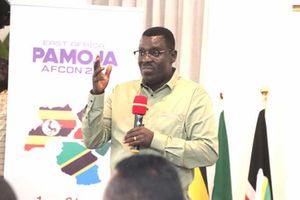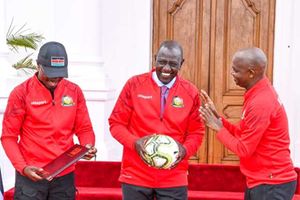
Ivory Coast president Alassane Ouattara celebrates with the trophy alongside the players after winning the Africa Cup of Nations final against Nigeria at the Stade Olympique Alassane Ouattara, Abidjan, Ivory Coast on February 11, 2024.
The 34th edition of the biennial Africa Cup of Nations came to a grand finale on Sunday night as hosts Côte d'Ivoire edged out Nigeria to cap four weeks of breathtaking football action.
The African football roadshow, popularly known as Afcon, moves to Morocco in 2025 (The tourney this month was actually the 2023 edition but was pushed back to avoid the Côte d'Ivoire rainy season), and then comes home to us in 2027 as Kenya co-hosts an East African festival with Uganda and Tanzania.
2027 might seem like a place far, far away; but we must realise that it is just around the corner in terms of the time required to host a major international sporting event. We must thus start asking ourselves if we are ready. Hosting any such event is complicated, and co-hosting with two other nations doubly so considering the jurisdictional overlaps that must be carefully navigated. The 36th edition will be the first ever to be jointly hosted by three different countries, and also the first to be held in the eastern African region since 1976 when it was staged in Ethiopia.
Although the Confederation of African Football, Caf, the continental governing body, is the official tournament organiser, the donkey work will always be done by the local organising committee, which in turn is naturally hostage to factors way beyond the exclusive remit of national football administrators.
The governments of Kenya, Uganda and Tanzania will obviously have to pick up much of the load in terms of financing and ensuring completion of the necessary infrastructure. Stadiums must be built or upgraded, roads and transport systems improved, airports modernised and so on, all at great cost to the taxpayer.
It goes without saying that there will be no prospects of Kenya hosting a single game if the task is left to the jokers who run the Football Kenya Federation. The government must therefore ‘own’ all the arrangements to a successful Afcon 2027, alongside seamless coordination with the Uganda and Tanzania. The big question, however, is if this government has capacity to deliver in a period when most energies will be diverted to re-election campaigns for the same year, 2027. In the midst of a faltering economy, political distractions and a penchant for extravagant promises but minimal delivery, it might seem a Mission Impossible.
It need not be so, for the just ended tournament provides an example of what is possible with determination and focus. Going by fairly recent history, Côte d’Ivoire should never even have been a contender to host the continental football tourney.
Once one of the most prosperous and stable countries in Africa, it has for most of this century been wracked by civil wars, political instability and near economic collapse. Afcon 2023 showed a nation that has picked itself up from the ashes to complete marvellous stadia and everything else towards what was no doubt a resounding success.
Here, we have a penchant for promising world-class, state-of-the-art, ultra-modern, high-tech and other extravagant descriptions but delivering zero or nothing near what was advertised. We must now put aside those habits and put mind, body and soul into Afcon 2027.
To do this, President William Ruto has to reorganise his priorities. Delivery on the continental festival which will place Kenya on the world map has to take precedence over 24/7 politricks and the usual advance excuses for failure. We have in the past been awarded, and then been stripped off, hosting rights for African soccer extravaganza simply because we were too lazy and unprepared to actually put it together.
We must therefore constantly remind ourselves that putting in a successful bid might actually be the easy part, but after that we must roll up our sleeves. Our two main stadiums, Kasarani and Nyayo both in the capital city, have been in a perpetual state of disrepair and are in dire need of total and very expensive work before they can host anything substantial. They are monuments to the legendary mismanagement that is the bane of Kenyan sports.
We are talking about building a brand new stadium at the Jamhuri Park complex in Nairobi, while the Kipchoge Keino stadium in Eldoret has to be upgraded from a village cattle track to international standards. Sports Cabinet Secretary Ababu Namwamba has promised that all these work will be ready by the end of 2025. He might need a reminder that we are now in 2024. Time is not on our side. President Ruto can get things going by kicking a few people up the backside.
[email protected]; @MachariaGaitho







